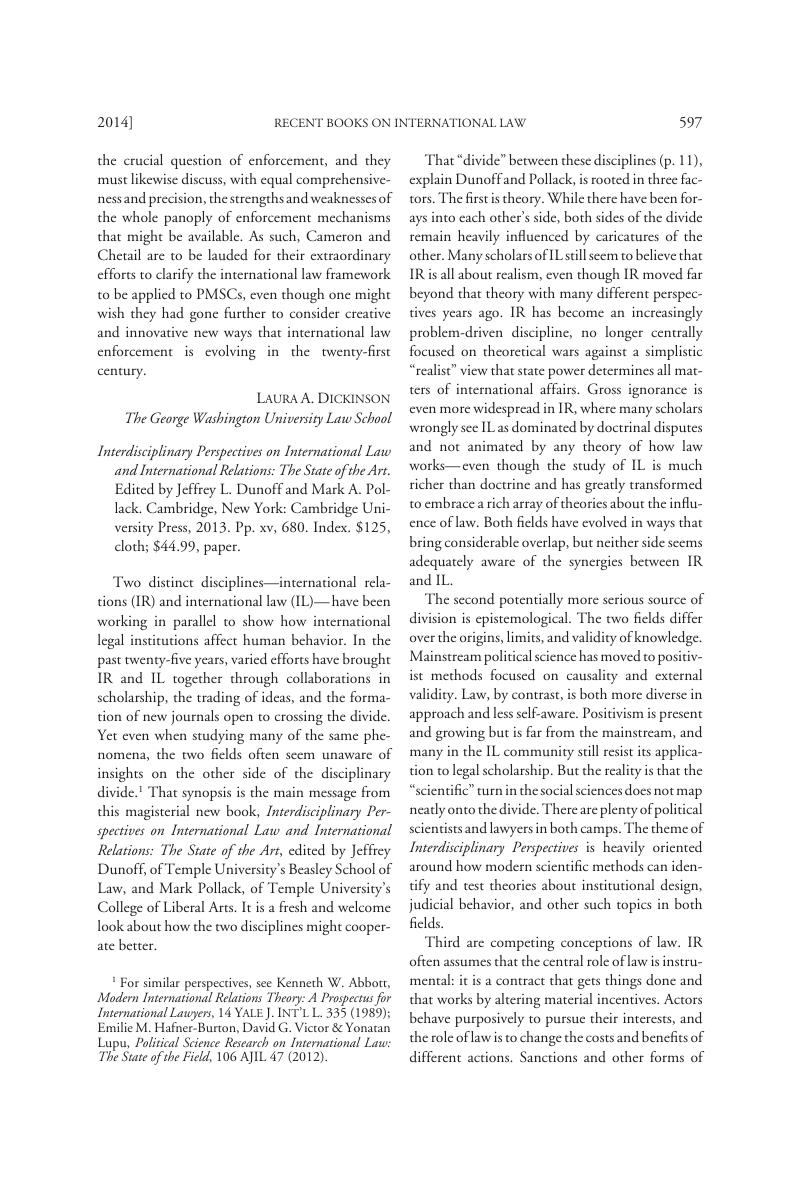Published online by Cambridge University Press: 20 January 2017

1 For similar perspectives, see Abbott, Kenneth W., Modern International Relations Theory: A Prospectus for International Lawyers, 14 Yale J. Int’l L. 335 (1989)Google Scholar; Hafner-Burton, Emilie M., Victor, David G. & Lupu, Yonatan, Political Science Research on International Law: The State of the Field, 106 AJIL 47 (2012)CrossRefGoogle Scholar.
2 For a more detailed discussion, see Hafner-Burton, Victor & Lupu, supra note 1.
3 see also Tim Büthe & Walter Mattli the New Global Rulers:The Privatization of Regulation in the World Economy (2011).
4 For a review of the social networks literature in IR, see Hafner-Burton, Emilie M., Kahler, Miles & Montgomery, Alexander H., Network Analysis for International Relations, 63 Int’l Org. 559 (2009)CrossRefGoogle Scholar; see also Lupu, Yonatan & Voeten, Erik, Precedent in International Courts: A Network Analysis of Case Citations by the European Court of Human Rights, 42 Brit. J. Pol. Sci. 413 (2012)CrossRefGoogle Scholar.
5 see Chayes, Abram & Chayes, Antonia Handler, On Compliance, 47 Int’l Org. 175 (1993)CrossRefGoogle Scholar; Andrew T. Guzman, How International Law Works:A Rational Choice Theory (2008); Jack L. GoldSmith & Eric A. Posner, The Limits of International Law (2006).
6 see Goldstein, Judith, Kahler, Miles, Keohane, Robert O. & Slaughter, Anne-Marie, Introduction: Legalization and World Politics, 54 Int’l Org. 385 (2000)CrossRefGoogle Scholar; Abbott, Kenneth W. & Snidal, Duncan, Hard and Soft Law in International Governance, 54 Int’l Org. 421 (2000)CrossRefGoogle Scholar.
7 see Hafner-Burton, Emilie M., Helfer, Laurence R. & Fariss, Christopher J., Emergency and Escape: Explaining Derogations from Human Rights Treaties, 65 Int’l Org. 673 (2011)CrossRefGoogle Scholar.
8 see The Implementation and Effectiveness of International Environmental Commitments: Theory and Practice (David G. Victor, Kal Raustiala & Eugene B. Skolnikoff eds., 1998); Downs, George W., Rocke, David M. & Barsoom, Peter N., Is the Good News About Compliance Good News About Cooperation?, 50 Int’l Org. 379 (1996)CrossRefGoogle Scholar; Hafner-Burton, Emilie M., Trading Human Rights: How Preferential Trade Agreements Influence Government Repression, 59 Int’l Org. 593 (2005)Google Scholar; Emilie M. Hafner Burton, Making Human Rights a Reality (2013); Beth A. Simmons, Mobilizing for Human Rights:International Law in Domestic Politics (2009); Mansfield, Edward D., Milner, Helen V. & Rosendorff, B. Peter, Free to Trade: Democracies, Autocracies, and International Trade, 94 Am. Pol. Sci. Rev. 305 (2000)CrossRefGoogle Scholar; Michael Tomz, Reputation and International Cooperation:Sovereign Debt Across Three Centuries (2007); Christina L. Davis, Why Adjudicate? Enforcing Trade Rules in the Wto (2012).
9 see Hafner-Burton, Victor & Lupu, supra note 1; Shaffer, Gregory & Ginsburg, Tom, The Empirical Turn in International Legal Scholarship, 106 AJIL 1 (2012)CrossRefGoogle Scholar.
10 see Raustiala, Kal & Slaughter, Anne-Marie, International Law, International Relations and Compliance, in Handbook of International Relations 538 (Carlsnaes, Walter, Risse, Thomas & Simmons, Beth A. eds., 2002)Google Scholar; Helfer, Laurence R. & Voeten, Erik, International Courts as Agents of Legal Change: Evidence from LGBT Rights in Europe, 68 Int’l Org. 77 (2014)CrossRefGoogle Scholar; Hafner-Burton, Helfer & Fariss,supra note 7;Abbott & Snidal, supra note 6.